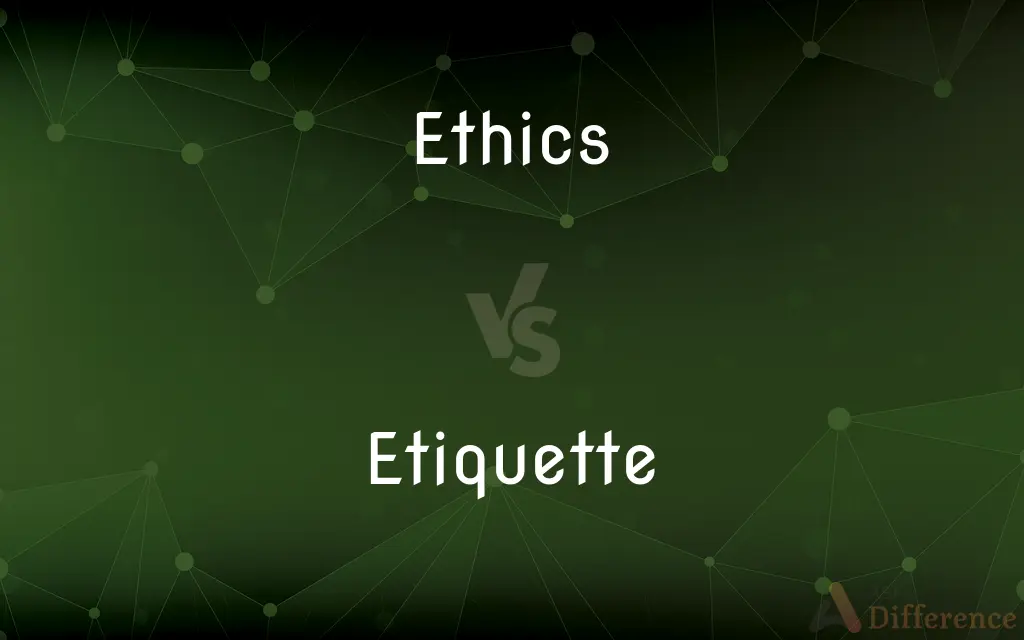Ethics vs. Etiquette — What's the Difference?
By Tayyaba Rehman — Updated on September 18, 2023
Ethics refers to the moral principles that govern behavior, while etiquette is the customary code of polite behavior in society. Ethics pertain to questions of right and wrong, whereas etiquette deals with what is socially acceptable or polite.

Difference Between Ethics and Etiquette
Table of Contents
ADVERTISEMENT
Key Differences
Ethics is the study or set of moral principles that guide individual or group behavior. It delves into the nature of good and evil, right and wrong, and may be applied universally. Etiquette, on the other hand, is more about the rules and guidelines for behaving properly in social settings, covering everything from table manners to appropriate conversation topics.
Ethics often concerns itself with justice, fairness, and the broader welfare of society. It aims to answer fundamental questions about the way one should live their life, often through frameworks like consequentialism or deontological theories. Etiquette is more situational, largely determined by social or cultural norms, and may not always align with ethical principles.
Ethically speaking, the objective is often to ensure that actions align with a set of moral principles, like honesty, integrity, and altruism. Etiquette focuses more on smoothing social interactions; it may dictate how to introduce people, how to behave at formal events, or even how to properly write an email.
From a grammatical standpoint, both "Ethics" and "Etiquette" are nouns, and both may also be used adjectivally as "ethical" and "etiquettical." While ethics can often involve high-stakes decisions with serious consequences, etiquette usually pertains to actions with lighter, more immediate social repercussions.
Comparison Chart
Focus
Moral principles
Social norms
ADVERTISEMENT
Scope
Universal
Situational
Implications
Often serious
Usually lighter
Part of Speech
Noun
Noun
Adjective Form
Ethical
Etiquettical
Compare with Definitions
Ethics
The study of moral principles that govern behavior.
The ethics class explored issues of justice and fairness.
Etiquette
A polite social practice.
Her etiquette is impeccable, making her a gracious host.
Ethics
The moral correctness of specified conduct.
The ethics of his decision were questionable at best.
Etiquette
The customary code of polite behavior in society.
Good etiquette requires sending a thank-you note after receiving a gift.
Ethics
A guiding philosophy.
His ethics prevent him from cheating, even when it's easy.
Etiquette
Manners and ceremonies established by convention.
Dining etiquette differs from one culture to another.
Ethics
A set of moral issues or aspects.
The ethics of gene editing are still being debated.
Etiquette
Etiquette ( and ; French: [e.ti.kɛt]) is the set of conventional rules of personal behaviour in polite society, usually in the form of an ethical code that delineates the expected and accepted social behaviours that accord with the conventions and norms observed by a society, a social class, or a social group. In modern English usage, the French word étiquette (ticket) dates from the year 1750.
Ethics
Rules of behavior based on ideas about what is morally good and bad.
The medical community has a strong code of ethics.
Etiquette
The customary code of polite behaviour in society or among members of a particular profession or group
The rules of etiquette are changing
Court etiquette was now familiar to Joan
Etiquette books
Ethics
Ethics or moral philosophy is a branch of philosophy that "involves systematizing, defending, and recommending concepts of right and wrong behavior". The field of ethics, along with aesthetics, concerns matters of value; these fields comprise the branch of philosophy called axiology.Ethics seeks to resolve questions of human morality by defining concepts such as good and evil, right and wrong, virtue and vice, justice and crime.
Etiquette
The practices and forms prescribed by social convention or by authority.
Ethics
Moral principles that govern a person's behaviour or the conducting of an activity
A code of ethics
Medical ethics also enter into the question
Etiquette
The forms required by a good upbringing, or prescribed by authority, to be observed in social or official life; observance of the proprieties of rank and occasion; conventional decorum; ceremonial code of polite society.
Ethics
The branch of knowledge that deals with moral principles
Neither metaphysics nor ethics is the home of religion
Etiquette
The customary behavior of members of a profession, business, law, or sports team towards each other.
Ethics
A set of principles of right conduct.
Etiquette
A label used to indicate that a letter is to be sent by airmail.
Ethics
A theory or a system of moral values
"An ethic of service is at war with a craving for gain" (Gregg Easterbrook).
Etiquette
The forms required by good breeding, or prescribed by authority, to be observed in social or official life; observance of the proprieties of rank and occasion; conventional decorum; ceremonial code of polite society.
The pompous etiquette to the court of Louis the Fourteenth.
Ethics
Ethics (used with a sing. verb) The study of the general nature of morals and of the specific moral choices to be made by a person; moral philosophy.
Etiquette
Rules governing socially acceptable behavior
Ethics
Ethics (used with a sing. or pl. verb) The rules or standards governing the conduct of a person or the members of a profession
Medical ethics.
Etiquette
Rules governing socially acceptable behavior.
Business etiquette dictates wearing a suit to an interview.
Ethics
(philosophy) The study of principles relating to right and wrong conduct.
Etiquette
A code of behavior that delineates expectations for social behavior.
Texting during dinner is considered bad etiquette.
Ethics
Morality.
Ethics
The standards that govern the conduct of a person, especially a member of a profession.
Ethics
The science of human duty; the body of rules of duty drawn from this science; a particular system of principles and rules concerting duty, whether true or false; rules of practice in respect to a single class of human actions; as, political or social ethics; medical ethics.
The completeness and consistency of its morality is the peculiar praise of the ethics which the Bible has taught.
Ethics
Motivation based on ideas of right and wrong
Ethics
The philosophical study of moral values and rules
Common Curiosities
Can Ethics and Etiquette clash?
Yes, what is polite may not always be ethical.
What is Etiquette?
Etiquette is the code of polite behavior in society.
Are Ethics universal?
Ethics often aims to be universal but can be subjective.
Is there a study for Etiquette?
No specific field, but it's often taught in social sciences.
Can you be ethical but have poor etiquette?
Yes, one can be morally right but socially awkward.
Is Etiquette universal?
Etiquette is usually situational and culturally specific.
What is the study of Ethics called?
It's referred to as ethics or moral philosophy.
What is Ethics?
Ethics refers to moral principles that guide behavior.
Is Ethics concerned with legality?
Not necessarily; something legal may not be ethical.
Is Ethics a set of written rules?
Not always; it can be a personal or cultural understanding.
Can you have good etiquette but poor ethics?
Yes, one can be polite but morally questionable.
Is Etiquette concerned with legality?
Rarely; it's more about social norms.
What's the adjective form of Ethics?
Ethical.
Is Etiquette a set of written rules?
Often, especially in formal settings like diplomacy or official events.
What's the adjective form of Etiquette?
Etiquettical.
Share Your Discovery

Previous Comparison
Devil vs. Saint
Next Comparison
Mortgage vs. ChargeAuthor Spotlight
Written by
Tayyaba RehmanTayyaba Rehman is a distinguished writer, currently serving as a primary contributor to askdifference.com. As a researcher in semantics and etymology, Tayyaba's passion for the complexity of languages and their distinctions has found a perfect home on the platform. Tayyaba delves into the intricacies of language, distinguishing between commonly confused words and phrases, thereby providing clarity for readers worldwide.
















































